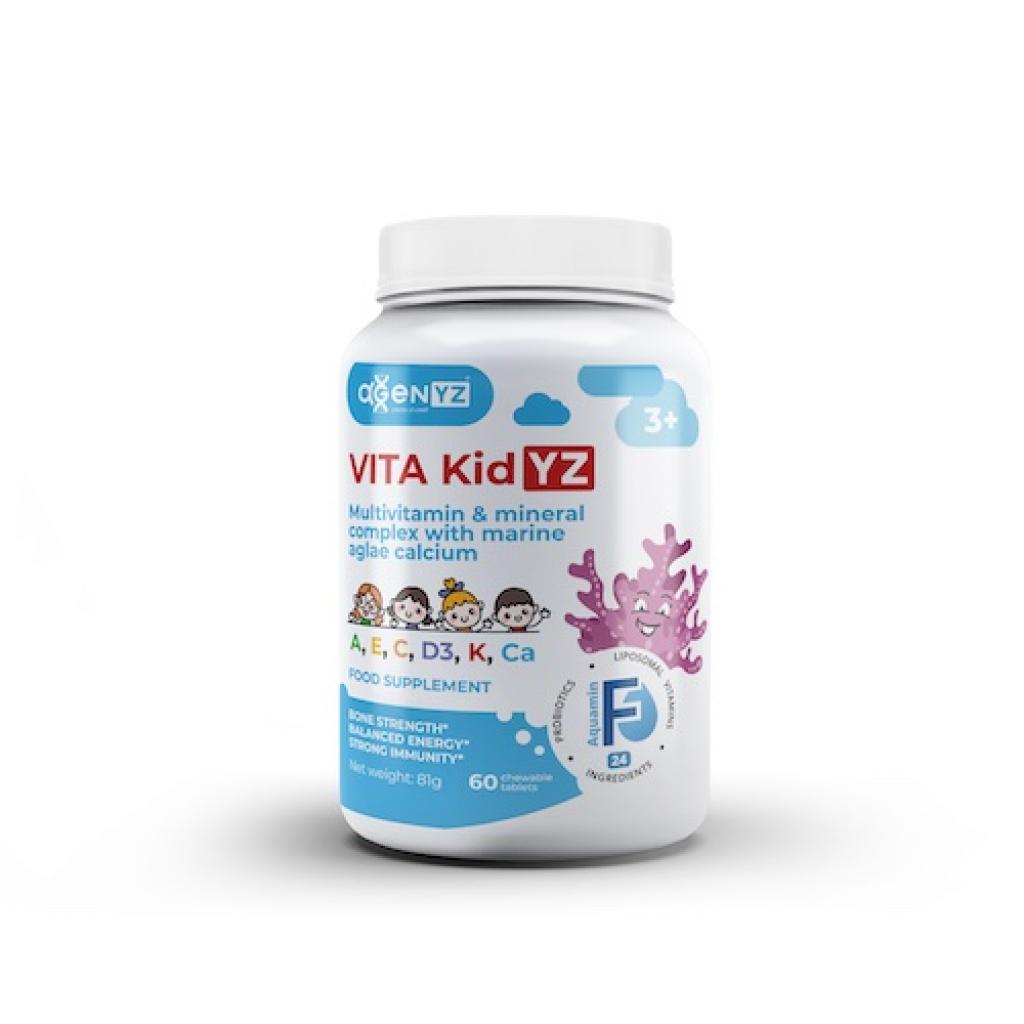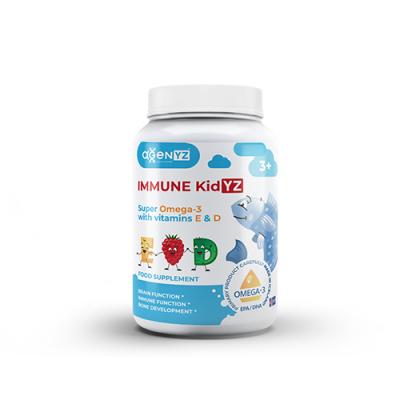



VITA KidYZ
Vita KidYZ is a vitamin and mineral complex for children.
A biologically active food supplement for children Vita KidYZ is a balanced vitamin and mineral complex necessary for the growth and development of children.
Contains 14 vitamins, 9 minerals, glycine and probiotics.
Available in the form of chewable tablets with an attractive taste of caramel pear.
60 tablets
NET WT. 81g
Vitamin-mineral complex for children Vita KidYZ contributes to:
· Mental and speech development of children;
· Proper metabolism;
· Complete assimilation of food;
· Normalization of intestinal microflora.
Advantages and bioinnovation:
· A unique balanced composition that provides all the necessary vitamins and minerals to the child's body.
· Liposomal forms of vitamins B1, B2, B12, E, and D3 ensures high bioavailability.
· Optimal ratio of calcium and phosphorus.
· Probiotics Bifidobacterium bifidum, Propionibacterium freudenreichii, as part of the complex contribute to the enhancement of the intestinal microflora.
· The amino acid glycine prevents the depletion of the nervous system in the child's body.
· Synergistic effect: one component of the complex enhances the other.
INGREDIENTS: tricalcium phosphate, plant-based calcium carbonate, choline bitartrate, magnesium lactate, rosehip extract, vitamin C (ascorbic acid), semi-finished liposome substance with vitamins E and D3, vitamin D3 (cholecalciferol), vitamin E (tocopherol acetate), glycine, liposomes with vitamins B1, B2, B12, «Panbiom» Bifidobacterium bifidum, «Panbiom» Propionibacterium freudenreichii, zinc citrate, iron pyrophosphate, beta-carotene, vitamin B3 (nicotinamide), vitamin B5 (calcium pantothenate), copper citrate, vitamin B6 (pyridoxine hydrochloride), manganese sulfate, iodocasein, vitamin K (menaquinone), vitamin B9 (folic acid), sodium selenite, vitamin H (biotin).
| Nutrients information per 2 tablets | %NRD* Kids 3-6 years old | |
|---|---|---|
| Zink | 8 mg | 200 |
| Vitamin B6 | 1 mg | 143 |
| Vitamin C | 39 mg | 130 |
| Folic acid (Vitamin B9) | 160 μg | 114 |
| Niacin (Vitamin B3) | 10 mg | 111 |
| Vitamin E | 7 mg | 88 |
| Vitamin K | 16,5 μg | 83 |
| Vitamin D3 | 15 μg | 75 |
| Pantothenic acid (Vitamin B5) | 2,94 mg | 74 |
| Iodine | 60 μg | 60 |
| Vitamin B1 | 0,395 mg | 56 |
| Biotin | 14 μg | 56 |
| Iron | 4 mg | 50 |
| Vitamin B2 | 0,384 mg | 38 |
| Selenium | 4,56 μg | 23 |
| Calcium | 134,8 mg | 18 |
| Manganese | 0,31 mg | 16 |
| Copper | 0,47 mg | 15 |
| Vitamin B12 | 0,24 μg | 12 |
| Choline | 74 mg | ** |
| Beta-Carotene | 2 mg | ** |
* nutrient reference value ** NRV not established
Vitamin C – is actively involved in strengthening children's immunity, and is necessary for the formation of collagen, blood vessel walls, cartilage and muscles which are vital for growth processes.
Vitamin B1 - is involved in energy metabolism, normalizes the activity of the nervous system, and is important for the proper functioning of the heart, blood vessels, and endocrine glands. With a lack of vitamin B1, immunity suffers. Vitamin B1 supplementation has been proven to improve cognitive abilities at a young age.
Vitamin B2 - is involved in protein and lipid metabolism, in the processes of hemopoiesis, is necessary for the normal development of the child and affects the learning process, and the condition of the mucous membranes and skin.
Vitamin B3 - contributes to the functioning of the circulatory and nervous systems and adrenal glands. Also involved in the metabolism of proteins and fats, the synthesis of hormones, dilates blood vessels and stimulates the synthesis of gastric juice and digestive enzymes.
Vitamin B4 - is responsible for the nutrition of nerve cells, protects them from damage and destruction, involves in the formation of new neural connections. It has a slight calming effect, helps to tolerate stress more easily and quickly adapts to emotional and mental stress.
Vitamin B5 – is responsible for many biochemical reactions, including the synthesis and oxidation of fatty acids, and is necessary for the construction, maintenance and development of cells, both in the central nervous system and in the body as a whole, helps maintain eye health, normal function of the liver and nervous system.
Vitamin B6 - involves in the formation of the nervous system, helps relieve anxiety and tension, regulates the metabolism; affects the production of insulin, reducing the risk of developing diabetes; plays an important role in the absorption of proteins and fatty acids, stimulates the brain and liver, regulates the condition of the skin; participates in the development of the hematopoietic system; affects the immune system, producing antibodies that fight viruses.
Vitamin B7 – involves in the metabolism of fatty acids, supports amino acids and carbohydrates, and ensures the normal functioning of the sweat glands, nervous tissue, bone marrow, male seminal glands, skin and hair cells.
Vitamin B9 - is necessary for the proper functioning of the hematopoietic, immune and nervous systems, and helps to cope with increased emotional and intellectual stress.
Vitamin B12 - plays an important role in the process of haematopoiesis, the metabolism of proteins, fats and carbohydrates, which is necessary for the myelination of nerve fibers and the normal state of the mind. It is essential for the formation and growth of bones.
Beta-carotene - is involved in the antioxidant defence of the body and is a precursor of vitamin A, which is necessary for cell growth and differentiation, it activates the immune system, and increases the body's resistance to infections. Preserves and restores good vision, necessary for the normal functioning of the retina. Supports healthy skin, hair and mucous membranes.
Vitamin E - is an antioxidant that prevents or significantly reduces the damage caused by free radicals to cells. In addition, vitamin E enhances the protective functions of the body, promotes better blood circulation, ensures its normal coagulation, is involved in the process of tissue regeneration, supports the health of the nervous system, and ensures the normal development and functioning of muscle tissue.
Vitamin D3 - vitamin D in the child's body is responsible for active growth, increase in body weight, muscle mass and bone density, the proper development of teeth, the formation of higher brain functions that determine the ability to learn, and the improvement of cognitive functions (abstract thinking, self-control, criticism).
Vitamin K - plays an important role in blood clotting and vascular strength. Promotes healthy kidney function, helps the body absorb calcium and ensures its normal interaction with vitamin D. In addition, vitamin K improves wound healing and normalizes intestinal motility.
Calcium and phosphorus - are essential trace elements for the development of bones and teeth. Without phosphorus, calcium metabolism in the body is disturbed, which potentially delays the proper development of the child's skeletal system. Phosphorus deficiency (as a result, calcium deficiency) is noticeable by pain in the bones and their fragility, and joint stiffness; the child becomes restless, irritable, and loses appetite; the growth of children with a lack of these two micronutrients slows down.
Magnesium - is involved in the synthesis of energy, and the work of many enzymes. Regulates the balance of excitation and inhibition processes in brain cells. Magnesium helps to cope with emotional and physical stress more easily and normalizes sleep. It is also necessary for the growth of bones and muscles.
Zinc - is a catalyst and activator of more than 70 enzymes that actively regulate the functioning of the nervous system, and renew processes in bone tissue. It is involved in the digestion process by regulating the regeneration processes of the skin and mucous membranes. Helps to cope with acne and dermatitis. ActivateS immune defences.
Iron - is part of many enzymes and proteins vital for the body. Iron is part of haemoglobin, a protein that is involved in the delivery of oxygen to organs and systems and provides oxygen to tissues. Involves the myelination of nerve fibers. Accordingly, it affects the neuropsychic development of children. Children with an iron deficiency are more susceptible to colds.
Copper - is involved in many processes occurring in the body, and is necessary for the formation of erythrocytes - red blood cells, and the synthesis of collagen and elastin, the main proteins for the skin, blood vessels and joints.
Manganese - affects hemopoiesis, skeletal development, and the functioning of the immune system and the brain. The lack of manganese in baby food leads to an impaired formation of the skeleton and a slowdown in development and growth, to a weakening of immunity and the development of allergies.
Iodine - is an integral part of thyroid hormones. Iodine deficiency provokes thyroid disease and mental retardation in children.
Selenium - is part of most hormones and enzymes, stimulates metabolic processes in the body, enhances the body's immunity, reduces the risk of developing cardiovascular diseases; acts as a strong antitumor factor, protects the body from the toxic manifestations of mercury, cadmium, lead, thallium and silver, stabilizes the nervous system.
Bifidobacterium bifidum is the main bacteria living in the human intestine. They are necessary for intestinal and liver disorders, to activate the immune response and to prevent certain types of cancer.
Propinibacterium freudereichii increases the content of butyrate, the number of bifidobacteria, lactobacilli, are a producer of acetic, propionic acids and cyanocabalamin (vitamin B12).
Live active probiotics help fight pathogenic microflora, improve the functioning of the digestive system, help increase the body's resistance to colds and infectious diseases, and reduce inflammation in the body.
Glycine - is an amino acid that activates cellular respiration and binds toxins and gives the body the strength to adapt to adverse conditions. In stressful situations, glycine is able to protect tissues from oxygen starvation. Glycine, among other things, nourishes the nervous tissue, helps it recover from overload, and also works as an inhibitory mediator and provides protection against nervous exhaustion.
Recommended daily dose and instructions for use: adults and children from age 3 chew one (1) tablet two (2) times a day with a meal.
Store at a temperature ≤ 25oС in a dark place with no more than 60% relative humidity.
Shelf life: Unopened - 2 years. Opened - 2 months.
Warnings: Do not exceed the stated recommended daily dose. Food supplements should not be used as a substitute for a varied and balanced diet and a healthy lifestyle. Store out of the reach of young children. Do not take in case of intolerance to the ingredients. It is recommended to consult a physician before use.
Buy it with
Contacts
support.eu@agenyz.com
+357-24-030-456

